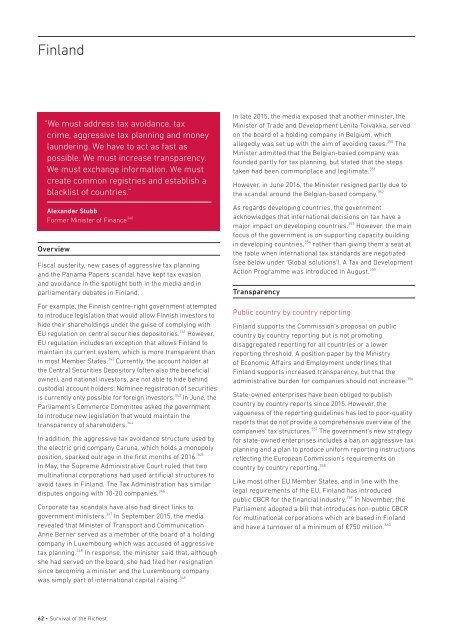Create successful ePaper yourself
Turn your PDF publications into a flip-book with our unique Google optimized e-Paper software.
Finland<br />
“We must address tax avoidance, tax<br />
crime, aggressive tax planning and money<br />
laundering. We have to act as fast as<br />
possible. We must increase transparency.<br />
We must exchange information. We must<br />
create common registries and establish a<br />
blacklist <strong>of</strong> countries.”<br />
Alexander Stubb<br />
Former Minister <strong>of</strong> Finance 340<br />
Overview<br />
Fiscal austerity, new cases <strong>of</strong> aggressive tax planning<br />
and <strong>the</strong> Panama Papers scandal have kept tax evasion<br />
and avoidance in <strong>the</strong> spotlight both in <strong>the</strong> media and in<br />
parliamentary debates in Finland.<br />
For example, <strong>the</strong> Finnish centre-right government attempted<br />
to introduce legislation that would allow Finnish investors to<br />
hide <strong>the</strong>ir shareholdings under <strong>the</strong> guise <strong>of</strong> complying with<br />
EU regulation on central securities depositories. 341 However,<br />
EU regulation includes an exception that allows Finland to<br />
maintain its current system, which is more transparent than<br />
in most Member States. 342 Currently, <strong>the</strong> account holder at<br />
<strong>the</strong> Central Securities Depository (<strong>of</strong>ten also <strong>the</strong> beneficial<br />
owner), and national investors, are not able to hide behind<br />
custodial account holders. Nominee registration <strong>of</strong> securities<br />
is currently only possible for foreign investors. 343 In June, <strong>the</strong><br />
Parliament’s Commerce Committee asked <strong>the</strong> government<br />
to introduce new legislation that would maintain <strong>the</strong><br />
transparency <strong>of</strong> shareholders. 344<br />
In addition, <strong>the</strong> aggressive tax avoidance structure used by<br />
<strong>the</strong> electric grid company Caruna, which holds a monopoly<br />
position, sparked outrage in <strong>the</strong> first months <strong>of</strong> 2016. 345<br />
In May, <strong>the</strong> Supreme Administrative Court ruled that two<br />
multinational corporations had used artificial structures to<br />
avoid taxes in Finland. The Tax Administration has similar<br />
disputes ongoing with 10-20 companies. 346<br />
Corporate tax scandals have also had direct links to<br />
government ministers. 347 In September 2015, <strong>the</strong> media<br />
revealed that Minister <strong>of</strong> Transport and Communication<br />
Anne Berner served as a member <strong>of</strong> <strong>the</strong> board <strong>of</strong> a holding<br />
company in Luxembourg which was accused <strong>of</strong> aggressive<br />
tax planning. 348 In response, <strong>the</strong> minister said that, although<br />
she had served on <strong>the</strong> board, she had filed her resignation<br />
since becoming a minister and <strong>the</strong> Luxembourg company<br />
was simply part <strong>of</strong> international capital raising. 349<br />
In late 2015, <strong>the</strong> media exposed that ano<strong>the</strong>r minister, <strong>the</strong><br />
Minister <strong>of</strong> Trade and Development Lenita Toivakka, served<br />
on <strong>the</strong> board <strong>of</strong> a holding company in Belgium, which<br />
allegedly was set up with <strong>the</strong> aim <strong>of</strong> avoiding taxes. 350 The<br />
Minister admitted that <strong>the</strong> Belgian-based company was<br />
founded partly for tax planning, but stated that <strong>the</strong> steps<br />
taken had been commonplace and legitimate. 351<br />
However, in June 2016, <strong>the</strong> Minister resigned partly due to<br />
<strong>the</strong> scandal around <strong>the</strong> Belgian-based company. 352<br />
As regards developing countries, <strong>the</strong> government<br />
acknowledges that international decisions on tax have a<br />
major impact on developing countries. 353 However, <strong>the</strong> main<br />
focus <strong>of</strong> <strong>the</strong> government is on supporting capacity building<br />
in developing countries, 354 ra<strong>the</strong>r than giving <strong>the</strong>m a seat at<br />
<strong>the</strong> table when international tax standards are negotiated<br />
(see below under ‘Global solutions’). A Tax and Development<br />
Action Programme was introduced in August. 355<br />
Transparency<br />
Public country by country reporting<br />
Finland supports <strong>the</strong> Commission’s proposal on public<br />
country by country reporting but is not promoting<br />
disaggregated reporting for all countries or a lower<br />
reporting threshold. A position paper by <strong>the</strong> Ministry<br />
<strong>of</strong> Economic Affairs and Employment underlines that<br />
Finland supports increased transparency, but that <strong>the</strong><br />
administrative burden for companies should not increase. 356<br />
State-owned enterprises have been obliged to publish<br />
country by country reports since 2015. However, <strong>the</strong><br />
vagueness <strong>of</strong> <strong>the</strong> reporting guidelines has led to poor-quality<br />
reports that do not provide a comprehensive overview <strong>of</strong> <strong>the</strong><br />
companies’ tax structures. 357 The government’s new strategy<br />
for state-owned enterprises includes a ban on aggressive tax<br />
planning and a plan to produce uniform reporting instructions<br />
reflecting <strong>the</strong> European Commission’s requirements on<br />
country by country reporting. 358<br />
Like most o<strong>the</strong>r EU Member States, and in line with <strong>the</strong><br />
legal requirements <strong>of</strong> <strong>the</strong> EU, Finland has introduced<br />
public CBCR for <strong>the</strong> financial industry. 359 In November, <strong>the</strong><br />
Parliament adopted a bill that introduces non-public CBCR<br />
for multinational corporations which are based in Finland<br />
and have a turnover <strong>of</strong> a minimum <strong>of</strong> €750 million. 360<br />
62 • <strong>Survival</strong> <strong>of</strong> <strong>the</strong> <strong>Richest</strong>


